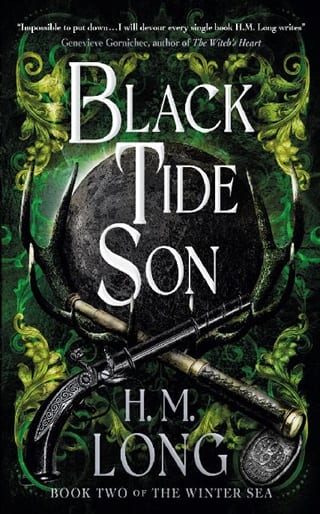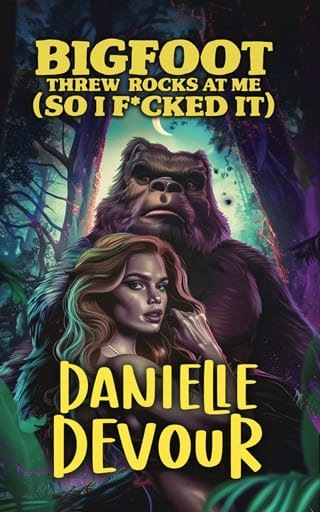Thirty-Four Ostchen
THIRTY-FOUR
Ostchen
SAMUEL
E ventually, after days of arduous travel, we reached Ostchen. The port city, home of the king's summer palace and the heart of the Mereish Navy, poured over the low mountains at the hilt of a deep bay in three distinct layers.
The ancient heart of this sprawling settlement was marked out by narrow, layered roofs, and tall stone buildings crammed shoulder to shoulder and racing one another towards the sky. This was surrounded by a thick wall, which divided the ancient from the simply old. Remnants of a secondary wall then divided old from new, and there the main body of the city rambled down to the shore of the water and a complex network of docks, locks, and seemingly isolated villages on stilts and lofty, irregular rocky islets. I saw masts of at least a hundred ships, and longed for Hart as I never had before. Was he there, now, within sight? Surely I would know.
Or perhaps I would not, with my Sight stifled. I felt blind. "What is that ?" Mary breathed. We had just dismounted and now stood at the top a long, switchbacking road down into the city. Black sheep dusted with white snow watched us over a mossy wall, and the scent of warm manure permeated the air.
Other travelers passed us by in clattering streams—carts and sleighs, riders and people on foot. Most headed into the city, and only the sleighs seemed to be heading out.
None paid us any mind. We were simply road-worn pilgrims and not worth more than a nod.
Following the line of Mary's pointing finger, I saw a huge cathedral with four spires, tucked into the city just before the docks. It perched above the sprawl, within the city but not part of it, and faced north down the length of the bay to the distant, fog-shrouded sea.
"The Cathedral of the Four Faces, which I understand to be the points of the compass," Grant replied.
We all glanced at him.
"How would you know that?" Ben asked.
Grant tapped the side of his head, smiling a humorless smile. His horse idled behind him, lipping at the first green flush of grass at the foot of the wall lining the road. "The beastie knows things, ostensibly. Adalia told him a great deal, though he seems to understand little of it."
"Understanding will come with time," Mary soothed, though something about her cadence had shifted, and I sensed Tane in her words.
Turning my focus back to the city, I marked how, beyond its limits to the east, west, and south, farms and rocky pastures for goats, sheep and rugged cattle occupied the heights of the low mountains. There were few trees—all was open and exposed, and ill-suited to an overland escape, if the need arose.
North along the bay, just on the edge of the fog bank and below the walls of a lording, star-shaped fort, several ships-of-the-line were anchored, including a massive second-rater with uncommon red sails furled and likely a hundred guns stowed behind her black-painted gunports.
"That is a fine ship," Ben commented covetously.
"And the bay must be deep," I added, studying her. "Deep and large enough for the bulk of the Mereish Fleet. So where is it? They cannot all be cruising."
"In that fog, I presume." Ben's gaze swept into the miasma. "Which inclines me to believe either the Mereish coast possesses some very tactful fog in the spring, or the fleet is intentionally concealed."
"Why conceal your fleet from your own people?" I muttered.
"Spies?" Mary stepped in closer, her cheeks flushed with cool sea air and her gaze distracted. Backed by the grey sky and the stony hills, she looked lovely in a raw, wild kind of way.
"Regardless, we have no idea how many ships are in that fog," I said to the company. " Hart may be among them, or he may be at the city dock. If I entered the Other, I might be able to sense something of him and the Uknaras, but Hae may be able to sight me or at least sense what direction we have gone."
"A last resort, then," Grant observed. "We follow the plan. Sell the horses, put our ears to the ground and search for Hart the traditional way."
"We could search for a High Cleric, too." Ben sent me a lingering look as he mounted again. He offered his hand to Grant. "Ride with me. Those two need to talk."
Grant handed over his reins with a shrug and took Ben's arm, mounting behind the saddle. Ben immediately set off, leaving his suggestion hanging in the air.
"Talk about what? Does he know about the healing?" Mary inquired quietly.
"Yes," I said, mounting up and freeing a stirrup for her. "But he is not willing. And there is no possibility of finding the cure now, regardless."
Mary swung up and settled behind me, closer than Grant had been to Ben. Her arms laced around my middle, her welcome warmth seeping through me.
"So you keep telling us," she said resignedly. "Let's move along, before those two get us into trouble."
Sprawling farms soon became networks of houses and shops, which ran all the way up to the outer wall. The stone barrier's watchtowers were clad with brightly painted shutters, and laundry criss-crossed the street to the neighboring newer buildings— wood with shingles or thatch roofs and lovingly decorated fa?ades. Children played and splashed through puddles, carts rumbled and adults milled about, shopping and chatting and going about their labors.
We found a livestock market before long, where Ben and Grant went about selling the horses and tack for a mildly exorbitant sum. We divided the money as discreetly as possible and embarked on our next task: finding our way through the hellish press of the city to the city docks.
"You visiting? If you're looking for an inn, you won't find one tonight," a hawker told us an hour later as we sheltered in the mouth of an alley. The gangly young man had a crate of broadsheets at his feet and sold them for small, tin dette coins to passersby. "Not with the tides and the refugees."
A parade of red-cloaked monks forced their way down the center of the street, chanting and leading a gilded palanquin. Briefly, the crowd grew so loud that even the hawker was drowned out.
He scowled at the commotion and bent, riffling down through his crate of papers. He pulled an older, crumpled one out and held out the opposite hand, palm up. "You'll want this," he said, directly in my ear.
I pulled back but handed him a dette in exchange for the paper and rejoined my companions in the relative privacy of the alley, which here meant we were alone except for three whores, wrapped in blankets and smoking pipes on a balcony several stories above, and a sleeping drunk under a pile of equally somnolent dogs.
I smoothed the creases from the paper and held it up so we could read together. I heard Mary murmuring the words under her breath, and Ben gave up almost immediately. He leaned against the wall, lacing his arms over his chest and looking up at the whores. One eyed him dispassionately, one smiled falsely, and the last came over to lean on the balcony rail and stare down at him in wordless assessment. Ben stared right back.
"‘ Soon we will see the second-highest Black Tide of the last centuries, surpassed only by next month's. The lower city has already been evacuated, and upper Ostchen now hosts many thousands of refugees from coastal villages ,'" Grant read, seemingly for Benedict's benefit.
Mary contemplated the broadsheet. "The Aeadine know how difficult this spring will be, right? All our coastal villages and ports will be prepared? Tithe?"
I shook my head. "They will not be prepared for it to be this high. Ostchen is bursting because even the Mereish villages are not equipped, and they knew it was coming."
"Good thing we do not intend to stay long," Ben muttered. He and the whore still watched one another, though he spoke low enough only we could hear his Aeadine.
"Did that word come from Adalia Day?" Grant asked. "Or is this all common knowledge in Mere?"
"If the Oruse had an observatory, others will too," Mary said. "Like the Ess Noti."
"Yes, I have no doubt the Ess Noti were well aware," I affirmed. Every thought of the organization grated my nerves, not only because of their threat and the coin still bound tight to my skin.
A cure was closer than ever. And for the sake of all of us—Mary, Grant, Ben, Hart , the Uknaras—I had to ignore it. Perhaps if we had to stay the night, I might slip away, but—the risk was so high. No.
No.
I continued, "It does not change our immediate needs. We must find Hart ."
Ben squinted at me. At the same time, the whores grew bored and vanished from the balcony above. "Just go into the Other, Sam."
"There is no need to risk that. Yet," Mary interjected. "We've all eyes in our skulls, and there cannot be so many ships around the city. I say we split up—Samuel and Charles, Ben and I. We search and set a place and time to reunite."
We all looked at one another: Ben impassive, Grant startled, and I off-footed. Despite all we had endured together, I doubted Mary would volunteer to partner with Ben without reason.
She, evidentially, read my thoughts. "You twins are too notable together and Benedict—" she added with the ghost of a grin "—is a terrible influence on Charles."
Grant scoffed. "Well I am a marvelous influence on him."
" And ," Mary added, becoming more serious, "I have Tane. I can Otherwalk, though I can't track as well as you. And if all else fails, Sam, we can look into the Other. So each pair will have similar advantages."
Ben studied Mary for a moment, passably curious now, then nodded. "We can meet in front of the cathedral we saw from the hill, the one with the four spires. Midnight bells?"
I glanced up at the sun, only to find it completely hidden in the crush of roofs, spires, chimney caps and laundry lines.
We still had a few hours before nightfall. Eight hours, then, to search for Hart . Eight hours separated from Mary, knowing she was alone with Ben. I did not like it, but I saw the wisdom in it, and I doubted Ben would outright harm the Stormsinger this far into their acquaintance.
I nodded. "Grant and I will go out to the naval docks and see what we can through that fog. Mary, Ben, search the public ones. We will see you at midnight."
 Fullepub
Fullepub 



